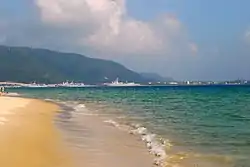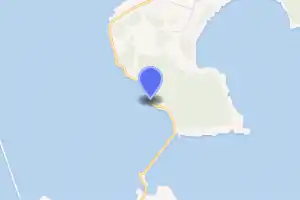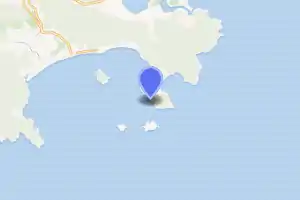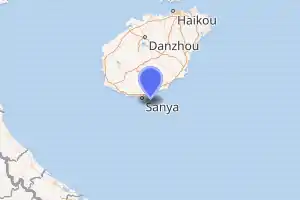Yulin Naval Base
Yulin Naval Base (Chinese: 榆林海军基地) is a naval base for nuclear submarines along the southern coast of Hainan Island, China.[2][3] This underground base has been reported by several intelligence agencies, especially Indian agencies. The images collected by the Federation of American Scientists (FAS) in February 2008 shows that China constructed a large scale underground base for its naval forces.[4] In August 2020, satellite imagery from Planet Labs appeared to show a Shang-class submarine entering the underground base.[5]
| Yulin Naval Base 榆林海军基地 | |
|---|---|
| Yalong Bay, Sanya, Hainan, China | |
 The base viewed from the Yalong Bay Beach | |



| |
| Type | Military base |
| Site information | |
| Controlled by | |
| Site history | |
| In use | 1955[1] – Present |
Description
The caverns are capable of hiding up to 20 nuclear submarines based on reconnaissance satellites data collected. The harbor houses nuclear ballistic missile submarines and is large enough to accommodate aircraft carriers. The US Department of Defense estimated that China would have five Type 094 nuclear submarines operational by 2010 with each capable of carrying 12 JL-2 intercontinental ballistic missiles. Two 950 metre piers and three smaller ones would be enough to accommodate two carrier strike groups or amphibious assault ships.
Location
The submarine base is located at the point in Chinese territory that is closest to the continental shelf. It is roughly 50 nautical miles (93 km) from the base to the 200 meter isobath. It is 150 nautical miles (280 km) to the closest of the disputed Paracel Islands or the city of Da Nang, Vietnam. Speculation has been raised that the base is intended to be expanded to include future capability for aircraft carrier groups.[6]
The submarine base is only a few miles from the city of Sanya, a popular tourist destination and the site of a major planned cruise hub.[7] The base is immediately next to the Yalong Bay National Resort District featuring many resort hotels.[8][9]
Strategic importance
More than half of the world's annual merchant fleet tonnage passes through the Strait of Malacca, Sunda Strait, and Lombok Strait, with the majority continuing on into the South China Sea. Tanker traffic through the Strait of Malacca leading into the South China Sea is more than three times greater than Suez Canal traffic, and well over five times more than the Panama Canal.[10] The People's Republic of China (PRC) has stated its claim to almost the entire body of water and is currently building multiple bases in the South China Sea to control them.[11]
See also
- Jianggezhuang Naval Base, nuclear submarine base in Qingdao
References
- [榆林海军基地]海军南海舰队
- "'Secret' Chinese Submarine Base on Hainan Island". The Jawa Report. May 3, 2008. Retrieved 2008-05-11.
- Harding, Thomas (2008-05-06). "Chinese nuclear submarine base". London: Telegraph. Retrieved 2008-05-11.
- "New Chinese SSBN Deploys to Hainan Island". FAS. April 24, 2008. Retrieved March 21, 2009.
- "Satellite photos appear to show Chinese submarine using underground base". CNN. August 21, 2020. Retrieved August 21, 2020.
- "China's new naval base triggers US concerns".
- "Sanya seeks cruise hub status".
- "Yalong Bay Guide (Chinese)".
- "China's Most Important South China Sea Military Base: The Yulin Naval Base is shaping up to be the most strategically important military base in the South China Sea". The Diplomat. 2017-03-09.
- "South China Sea Oil Shipping Lanes".
- "China's new n-submarine base sets off alarm bells". IndianExpress. 2008-05-03. Retrieved 2008-05-11.
External links
- Dunning, Brian (December 3, 2013). "Skeptoid #391: 8 Secret Bases: Real of Fictional?". Skeptoid.
5. Yulin Naval Base